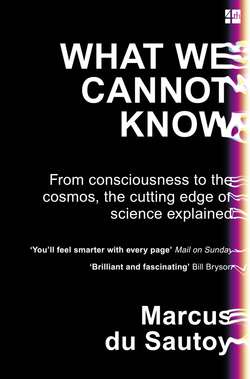Читать книгу What We Cannot Know: Explorations at the Edge of Knowledge - Marcus Sautoy du - Страница 8
THE KNOW-IT-ALL PROFESSORSHIP
ОглавлениеA few years ago I got a new job title to add to my role as a professor of mathematics at the University of Oxford. It often makes me laugh: the Simonyi Professor for the Public Understanding of Science. There seems to be a belief that with such a title I should know it all. People ring me up expecting that I know the answers to every question of science. Shortly after I’d taken on the job, the Nobel Prize for medicine was announced. A journalist called, hoping for an explanation of the breakthrough that was being rewarded: the discovery of telomeres.
Biology has never been my strong point, but I was sitting in front of my computer screen and so I’m embarrassed to admit I got the Wikipedia page up on telomeres and, after a quick scan, proceeded to explain authoritatively that they are the bit of genetic code at the end of our chromosomes that controls ageing among other things. The technology we have at our fingertips has increased that sense that we have the potential to know anything. Just tap my question into a search engine and the device seems to predict, even before I’ve finished typing, what it is I want to know and provides a list of places to find the answer.
But understanding is different from a list of facts. Is it possible for any scientist to know it all? To know how to solve non-linear partial differential equations? To know how SU(3) governs the connection between fundamental particles? To know how cosmological inflation gives rise to the state of the universe? To know how to solve Einstein’s equations of general relativity or Schrödinger’s wave equation? To know how neurons and synapses trigger thought? Newton, Leibniz and Galileo were perhaps the last scientists to know all that was known.
I must admit that the arrogance of youth infused me with the belief that I could understand anything that was known. If someone’s human brain out there has found a way to navigate a path to new knowledge, then if the proof works in their brain it should work in mine. With enough time, I thought, I could crack the mysteries of mathematics and the universe, or at least master the current lie of the land. But increasingly I am beginning to question that belief, to worry that some things will forever remain beyond my reach. Often my brain struggles to navigate the science we currently know. Time is running out to know it all.
My own mathematical research is already pushing the limits of what my human brain feels capable of understanding. I have been working for over ten years on a conjecture that remains stubbornly resistant to my attempts to crack it. But my new role as the Professor for the Public Understanding of Science has pushed me outside the comfort zone of mathematics into the messy concepts of neuroscience, the slippery ideas of philosophy, the unfounded theories of physics. It has required a different way of thinking that is alien to my mathematical mode of thought, which deals in certainties, proofs and precision. My attempts to understand everything that is currently regarded as scientific knowledge has severely tested the limits of my own ability to understand.
The process of attaining knowledge necessarily relies on our standing on the shoulders of giants, as Newton famously declared about his own breakthroughs. And so my own journey to the edges of knowledge has involved reading how others have articulated the current state of knowledge, listening to lectures and seminars by those immersed in the field I’m trying to understand, talking to those pushing the boundaries, questioning contradictory stories, consulting the evidence and data recorded in the scientific journals that support a theory, even at times looking up an idea on Wikipedia. Although we teach students to question any information that pops up from a Google search, research has revealed that Wikipedia’s accounts of topics at the less controversial end of the scientific spectrum, like the theory of general relativity, are regarded as on a par with accounts in the scientific literature. Choose a more contested issue, like climate change, and the content might depend on what day you look.
This raises the question of how much can you trust any of these stories. Just because the scientific community accepts a story as the current best fit, this doesn’t mean it is true. Time and again, history reveals the opposite to be the case, and this must always act as a warning that current scientific knowledge is provisional. Mathematics perhaps has a slightly different quality, as I will discuss in the final two chapters. Mathematical proof provides the chance to establish a more permanent state of knowledge. But it’s worth noting that even when I am creating new mathematics, I will often quote results by fellow mathematicians whose proofs I won’t have checked myself. To do so would mean running in order to keep still.
And for any scientist the real challenge is not to stay within the secure garden of the known but to venture out into the wilds of the unknown. That is the challenge at the heart of this book.
